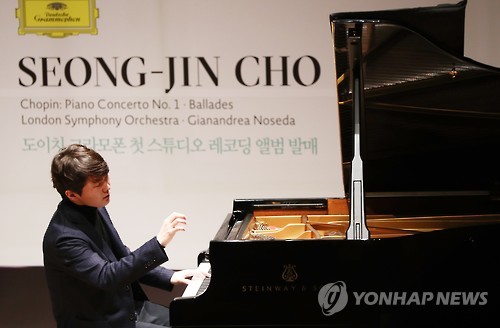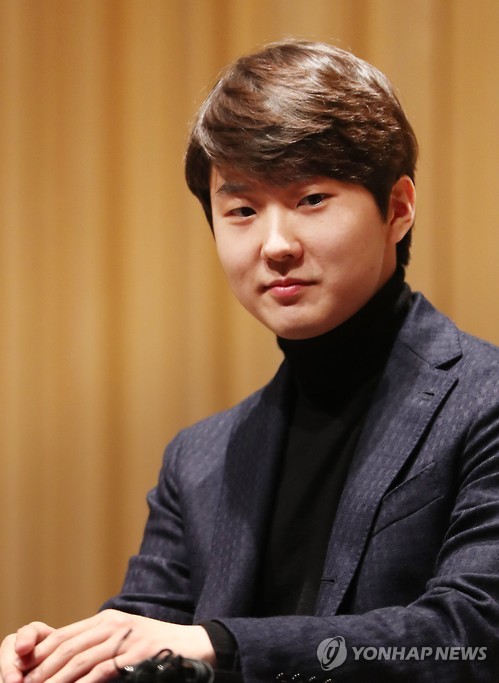- California Assembly OKs highest minimum wage in nation
- S. Korea unveils first graphic cigarette warnings
- US joins with South Korea, Japan in bid to deter North Korea
- LPGA golfer Chun In-gee finally back in action
- S. Korea won’t be top seed in final World Cup qualification round
- US men’s soccer misses 2nd straight Olympics
- US back on track in qualifying with 4-0 win over Guatemala
- High-intensity workout injuries spawn cottage industry
- CDC expands range of Zika mosquitoes into parts of Northeast
- Who knew? ‘The Walking Dead’ is helping families connect
Pianist Cho Seong-jin calls monotony his biggest foe
SEOUL, Nov. 16 (Yonhap) — Pianist Cho Seong-jin, South Korea’s first winner of the world-renowned International Fryderyk Chopin Piano Competition in Warsaw, picked monotony as his biggest threat while recording his first studio album.
Dressed classically in a black suit and turtleneck sweater, the shy 22-year-old prodigy showed up to a press conference for his new album in eastern Seoul on Wednesday.
The work is Cho’s first-ever studio recording since signing with global classical music label Deutsche Grammophon, right after his triumph at the Polish competition in October 2015.

South Korean pianist Cho Seong-jin, 22, performs pieces from Chopin’s “Piano Concerto No. 1 Ballades” during a press conference held in eastern Seoul on Nov. 16, 2016. The media event was organized to promote his first studio album, accompanied by London Symphony Orchestra under Maestro Gianandrea Noseda and published by German classical label Deutsche Grammophon.
Before showcasing two parts from the enlisted works, Cho came under the media spotlight for being a young contender.
When asked about his greatest emphasis throughout the recording process, he said: “After the Chopin Piano Competition, I got to play Chopin’s concerto countless times. That generated a certain monotony, playing out of routine, which I tried the most to keep out during the recording process. I tried to play with a sense of freshness, as if this was my first time playing the piece.”
Titled “Chopin: Piano Concerto No. 1 Ballades,” the album is to be released on Nov. 25. All of his previous recordings are copies of his stage performances.
The album comes in two versions: regular and delux. The regular, seven-piece copy includes movements from “Concerto for Piano and Orchestra No. 1 in E minor op. 11,” “Ballade No. 1 in G minor op.23,” “Ballade No. 2 in F major op. 38,” “Ballade No. 3 in A flat major op. 47″ and “Ballade No. 4 in F minor op. 52.” A 4-minute bonus track, “Nocturne in C-sharp minor op. posth.,” is added to the delux album, which is exclusively released in Korea.
The South Korean musician said the teamwork was great between him and the London Symphony Orchestra, led by Maestro Gianandrea Noseda, during recording.
“I greatly appreciate Maestro Noseda — I felt very comfortable working with him,” he said.

South Korean pianist Cho Seong-jin attends a press conference held in eastern Seoul on Nov. 16, 2016.
In addition, Cho made a case to Korean “tiger parents,” who are known to push their children for higher scholastic or musical achievements, for lighter encouragement of their kids.
“My parents hardly pressured me (to play piano.) My mom didn’t expect me to keep playing piano — She’d thought I would lose interest in it at certain point,” he said.
In fact, his father did not like to see him emotionally stressed by competitions. Rather, he told Cho that he could quit playing whenever he wanted to.
“I think (success in) music can hardly be achieved through pressure and force,” he said.

South Korean pianist Cho Seong-jin performs pieces from Chopin’s “Piano Concerto No. 1 Ballades” during a press conference held in eastern Seoul on Nov. 16, 2016.
The pianist, moreover, insisted that comparing two different performances is one of the biggest difficulties in the world of classical music.
“There are times when music defies easy explanation or comparison, which is the biggest distinction from products like televisions and smartphones, which has fixed utility,” Cho said.
On the other hand, he wanted to stress the fact that ballade is a form that was not yet common in Chopin’s time. It was Beethoven’s sonata and string quartet that comprised the prevalent format of those times.
Chopin is famous for his classical masterpieces, but not so many people pay attention to his innovative vision, according to Cho.
Chopin played a big role in developing far more uncommon forms of music, such as ballade and scherzo — one of Chopin’s greatest legacies, the pianist said.
“I thought (Chopin’s) ballades are especially rich in new, innovative ideas of his time, such as in tonality, form and details,” he said.
“I did my best to embrace that innovative idea in the upcoming album,” he added.

South Korean pianist Cho Seong-jin bows to the audience during his concert with Warsaw Philharmonic Orchestra at the Lincoln Center in New York on Oct. 24, 2016.
Until his next piano recital in Romania on Nov. 23, Cho plans to stay with his family here, and not his residence in Paris.
The winner of prestigious 17th international Frederic Chopin piano competition is entitled to hold concerts in some of the world’s best-known halls, including the main hall of Carnegie Hall in New York, and a recording contract with world-class labels.
Of 78 pianists from 20 countries, including Poland, the U.S. and China, he was one of the top 10 finalists from eight countries, and turned out to be the best performer of one of Chopin’s piano concerti with the Warsaw Philharmonic. His choice was the Concerto in E minor, Op. 11.
It was the first time in 10 years that a South Korean player made the top 10, and the first time ever for a South Korean to win the competition. The best achievement by South Korean pianists prior was by Lim Dong-min and his brother Dong-hyek who won third prize at the 2005 event.








![일본 사도광산 [서경덕 교수 제공. 재판매 및 DB 금지]](http://www.koreatimesus.com/wp-content/uploads/2024/07/PYH2024072610800050400_P4-copy-120x134.jpg)


